
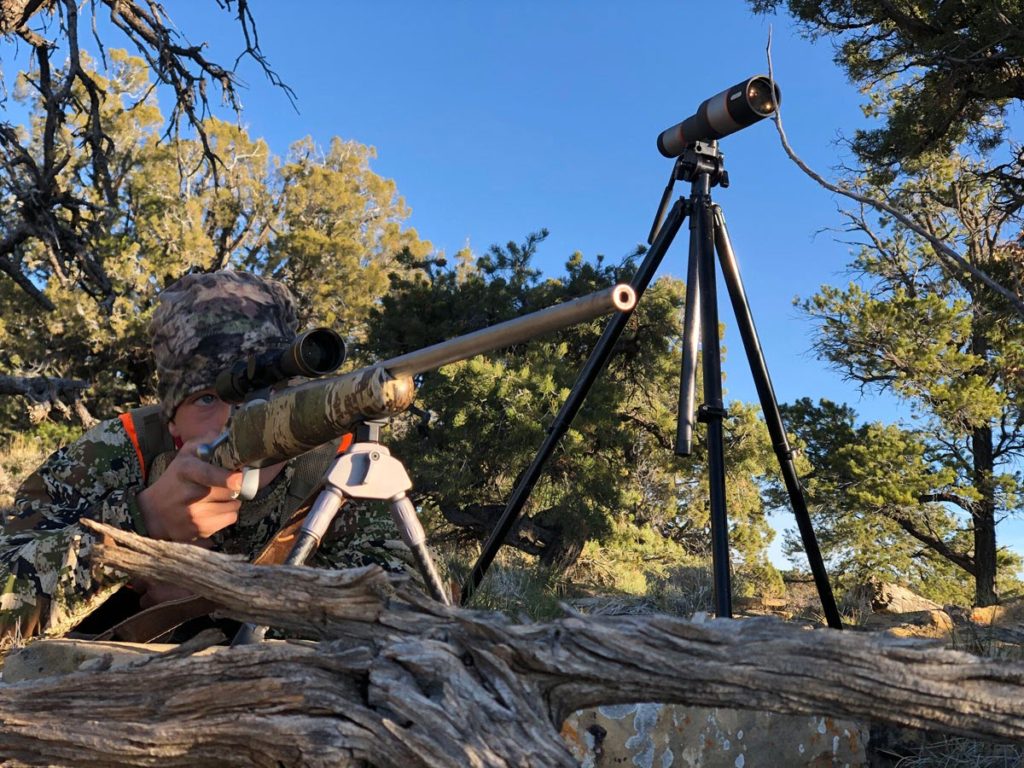
THE SCENARIO
Remember your first hunts as a kid, following Dad into the woods and thickets in search of a deer? Time-
travel back to that age and imagine that the gods of luck smiled on you, drawing a great mule deer tag
for a distant state and writing your name on it. You dream and plan all summer…
The time finally arrives, and with your lucky Utah mule deer tag in your pocket you and your father drive twelve long hours from your home in Arizona and meet up with Jim, another long-time hunting buddy. You then backpack several miles into the backcountry, set up camp, and start hunting. You hunt, hike, and glass hard for several days and catch a few glimpses of distant, stealthy bucks, but never get a shot opportunity.
On the third morning of the hunt, you’re again up in the pre-dawn darkness, have a small breakfast, and watch as shooting light opens the sagebrush flats. Dawn arrives, and you hunt your way a mile or so out to a sandstone knoll. Carefully, you crawl to the top and start glassing. In days past you’ve spotted three shooter bucks from this knoll; two on the far side of a steep canyon and the third crossing a distant sage flat just before dark.
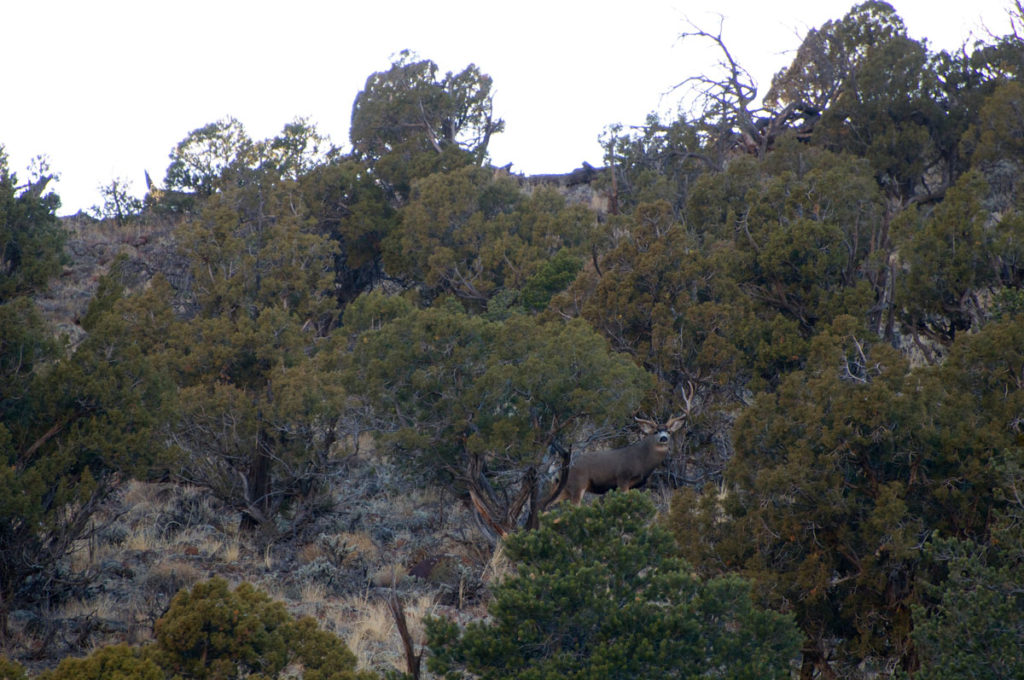
The morning marches on, and your dad spots a group of does and a couple of young bucks feeding off to the west, in a sheltered hollow out of the wind. Then, as you turn for perhaps the fiftieth time and glass that steep canyon slope you spot two deer feeding, startlingly obvious in the late morning light. You report this to your father and he hurriedly sets up his spotting scope, a 12-27X56 superlight Maven. He identifies them as the same bucks you saw in that canyon two days earlier. You leave Jim on the knoll with his spotter while the two of you try to close the distance. Grabbing your pack and gun you follow your dad as he descends from the ‘Crows Nest’. Stealthy, you hurry your way to the belt of pines along the rim of the canyon.
You sneak through the pinyon pines towards the edge of the canyon, racking a shell into the chamber as you go. Crawling to the sandstone lip, you poke your muzzle and one eyeball around a huge old cliff-edge cedar tree, get prone over your Spartan bipod and settle your scope on the two large bucks. Your father calls the range at 499 yards, and you dial your yardage turret. In normal conditions, you’re confident you can make this shot, but you’ve got a problem: a heavy crosswind your dad estimates at 9-12 miles per hour.
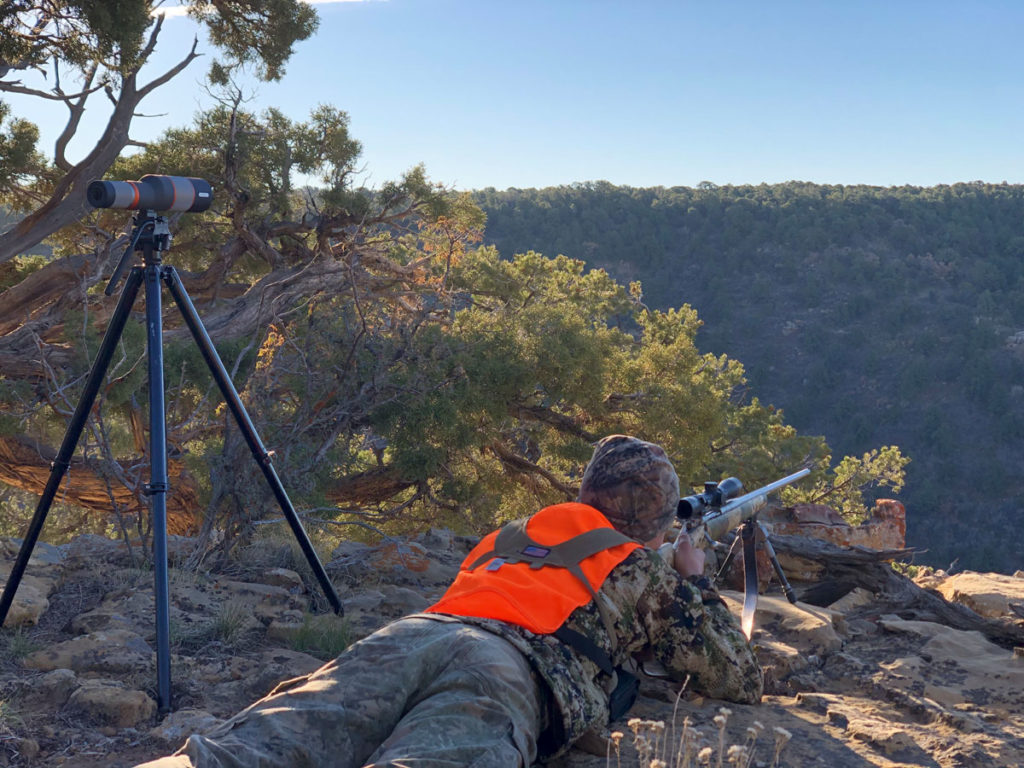
YOUR SHOOTING GEAR
You’re hunting with your favorite rifle, a superlight bolt action chambered in .280 Ackley Improved. Your scope is a 2.5-8X36mm Leupold VX3i, topped with a custom-cut yardage turret made to match your rifle and ammos’ ballistic profile. The scope rests in lightweight Talley one-piece mounts.
Your rifle’s loaded with Hornady Precision Hunter ammunition topped with a 162-grain ELD-X bullet sporting a G1 Ballistic Coefficient of 0.631. Muzzle velocity is a snappy but steady 2,836 feet per second. At the current distance of 499 yards, the ELD-X will drop just over 36 inches, be traveling at 2,281 fps, and have 1,872 ft.-lbs. of kinetic energy at impact.
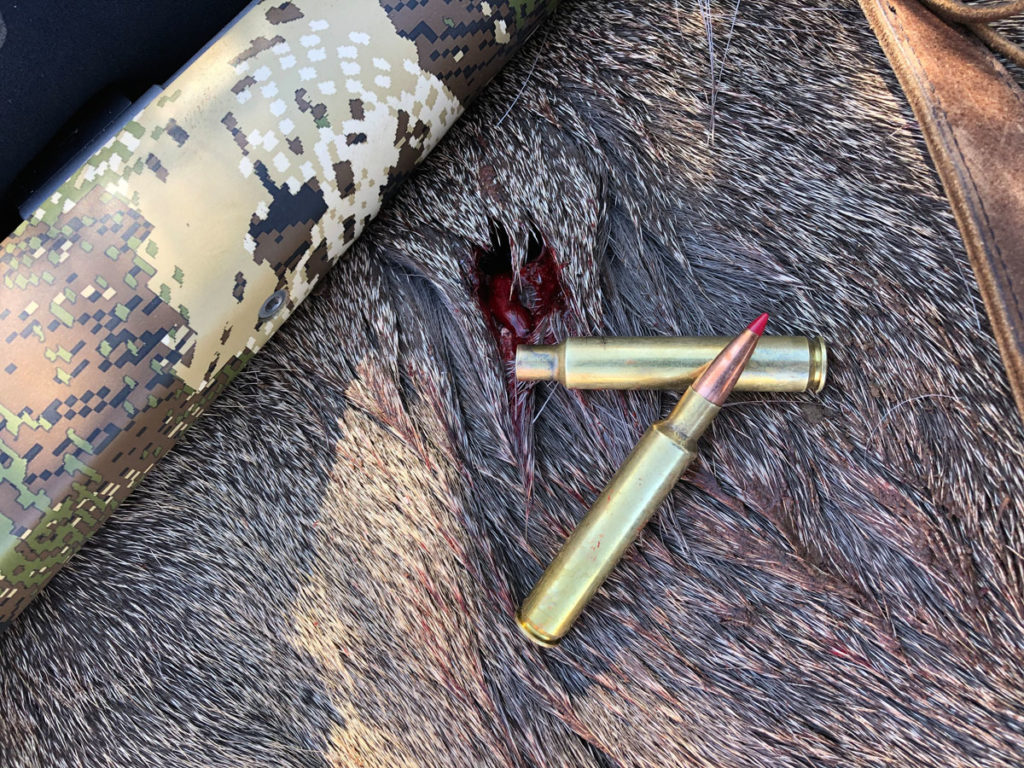
For support, you’re using a Spartan Precision Javelin Pro bipod, which utilizes a rare earth magnet to attach it to the gun, and is great for quick use. Furthermore, it’s incredibly lightweight and durable; valuable attributes when hunting deep in the wilderness. Under the buttstock you snuggle your left hand, using it for rear support. Your crosshairs are steady on the uppermost big buck. You’re ready, but there’s still the wind…
Belly-down on the hard sandstone of the canyon rim, you wait. The wind whips through your hair and across your cheek on its way to Canada. At least the wind is consistent. The second buck is somewhere below, just his hindquarters showing through the brush. Your father stares through the spotting scope and still, you wait. This buck in your sights is unusual, even when we first spotted him over a thousand yards away and several days earlier we’d seen that. “I can see that strange one right now,” you say.
“I think you should shoot that buck,” Papa says.
Put yourself in my shoes. Can you make the shot?
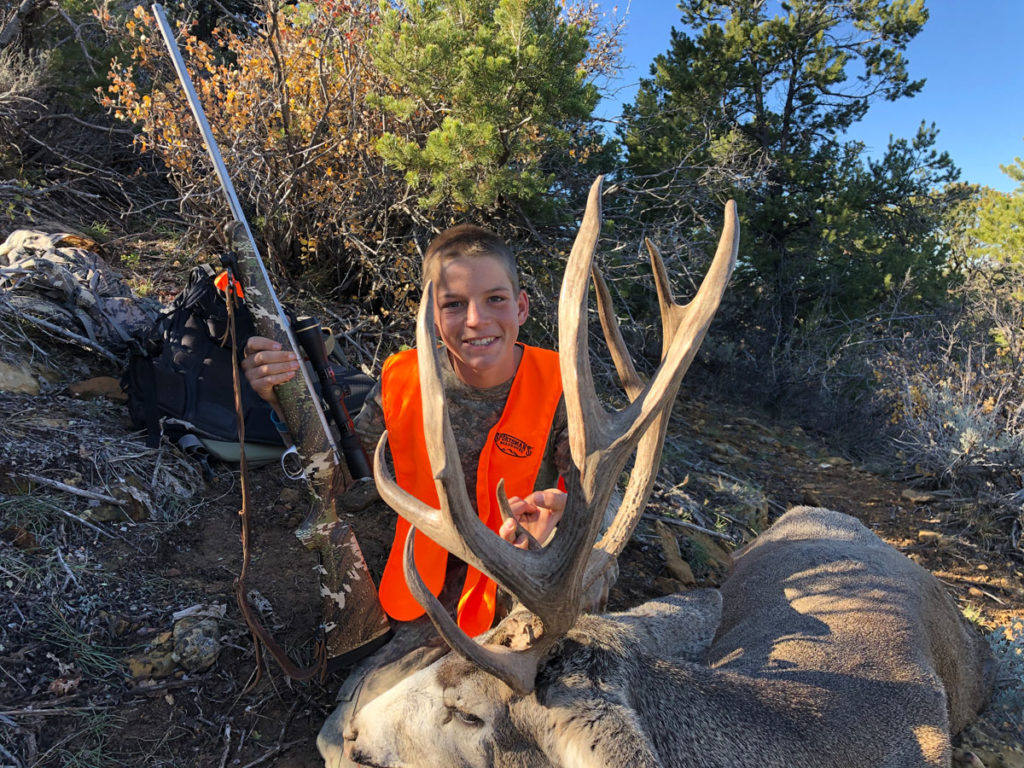
HERE’S WHAT HAPPENED (TRUE STORY)
“Just hold into the wind, on the front of his shoulder,” my father said, “and squeeze the trigger.”
The deer was broadside, facing right (into the wind). I settled my crosshairs on the front of his shoulder and pressed the trigger. My rifle recoiled and the bullet arced across the canyon and hit the deer with a loud WHOP. The buck dropped in his tracks and tumbled out of sight behind some oak brush. Rapidly chambering another round I tried in vain to find the buck through my scope. “I can’t see him”.
“He dropped in his tracks”, my Dad told me. “Stay ready, but you hit him good; I saw the impact. He’s not getting back up.”
My father congratulated me and Jim came celebrating off the hill to join us. They both seemed as happy as I felt, and we were pretty giddy for a while, talking about the buck, the shot, and the canyon we had to cross to get to him.
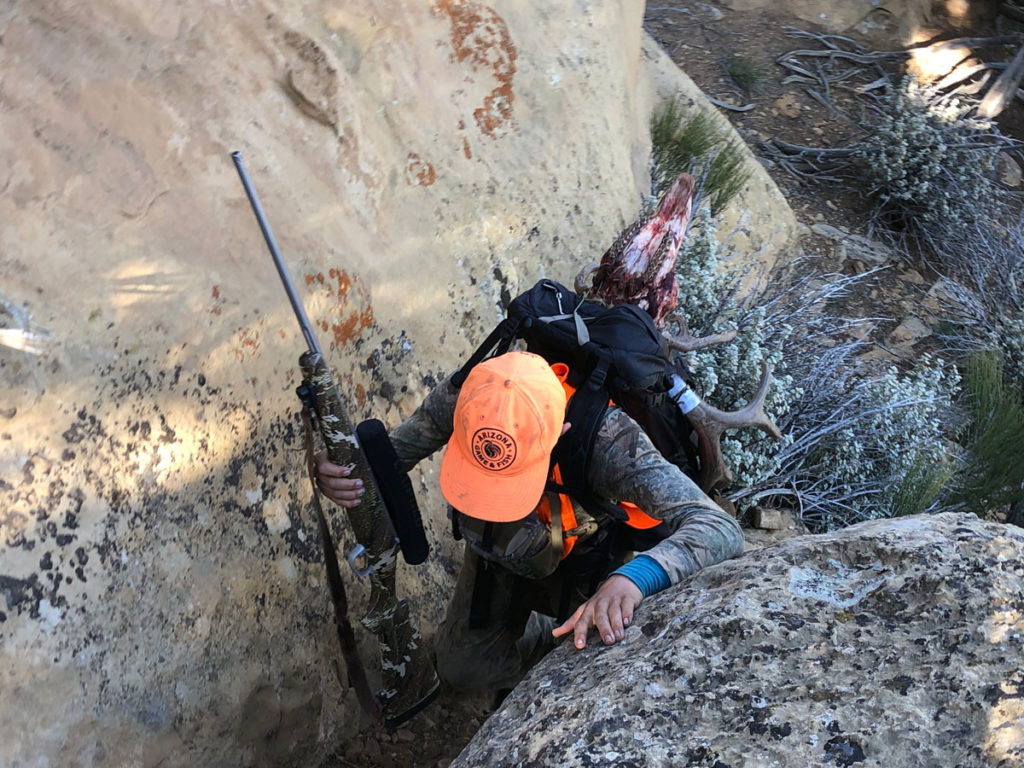
My Dad tells me he saw a long non-typical tine on the buck’s antler, coming low off the right side. That’s why he gave me the go-ahead to shoot the buck. As we talk, we all jettison what superfluous gear we can and leave it on the rim of the canyon. We’re facing a brutal pack out and won’t carry anything that’s not essential across the canyon.
We make our way into the canyon, navigating down through three or four sandstone ribbon cliffs and up the thick scrub-oak encrusted opposite side to the deer. He’s a mature buck with a white face and a thick, heavy body. Best of all he has heavy bases with long burr tines rising like the brow tines on a bull elk, with additional gnarly, hooked points above them. My father examines his teeth and estimates his age at 5.5 years old. He is heavy, massive, and old, and we are all ecstatic about him, and about my perfect, one-shot kill. The bullet hit him behind the shoulder and high, ranging slightly forward and down to take out both lungs before exiting and burying in the soil of the steep canyonside. The buck dropped in his tracks and tumbled and slid downhill 10 or 12 feet before coming to rest against some rocks and brush.
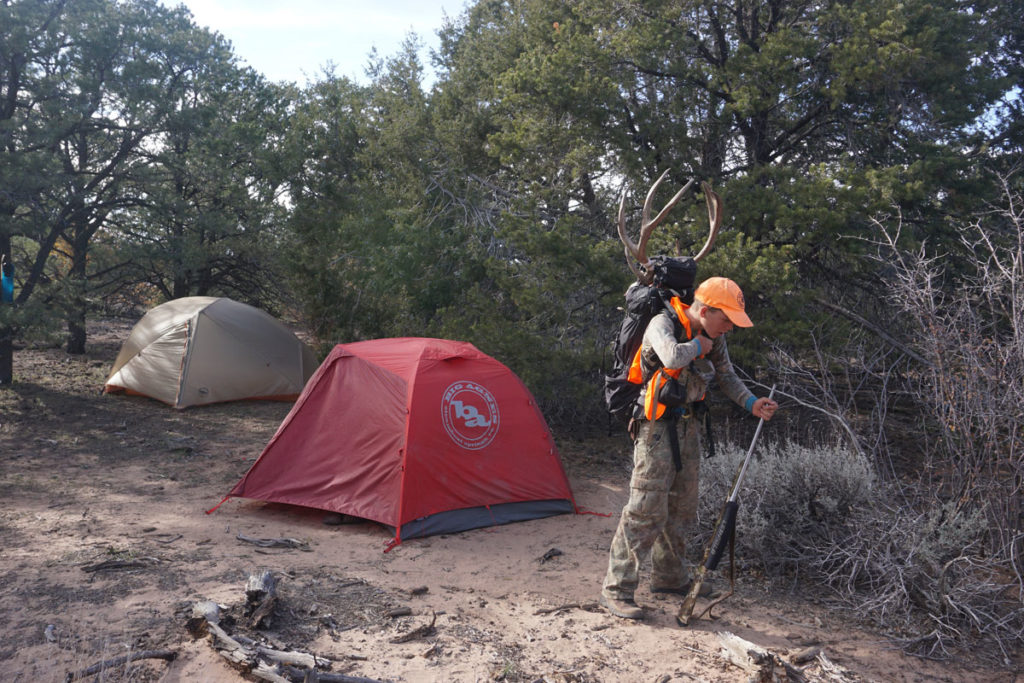
CONCLUSION
This was a challenging shot, but with the right equipment and skill, very doable. For this kind of shot, it’s key to have an experienced person behind a spotting scope to help read wind and spot impact. Also important was the fact that the wind, though strong, was relatively steady. That enabled us to make a solid estimate of how much drift the bullet would have. All that remained was to dial for the distance and execute an accurate shot.
That said, this kind of shot should never be considered “easy”. Only a hunter with significant experience and skill at shooting long-range targets should take such a shot. Are you that shooter? If not, could you be? Let me know your thoughts in the comment section below.
By Josiah von Benedikt
With Aram von Benedikt



Congrats on the hunt. Lucky shot for a youngster; you dialed the elevation; why not the wind? Knowing the wind speed, it would have been easy math to dial and “hold on” rather than risk a hold-off shot.
Imagine the effect on the hunter if things went wrong, and he wounded the animal and it got away?
As parents of young hunters we love to see our kids succeed and kill the ‘big one” but seldom give much thought to what might happen if things go wrong.
Best of luck on future hunts, you’ve got a great hunting partner in the making